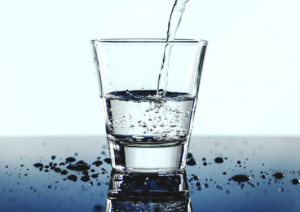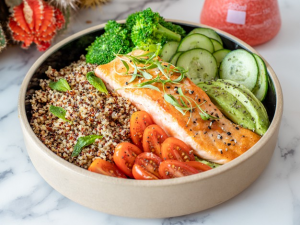
Intermittent Fasting (IF) has become one of the topics that is brought up whenever we talk to people about weight loss or search online for ways to do so in the recent years. While the term “fasting” is not something foreign as it has been practiced in many religions and cultures, more prominently for our Muslim friends who are currently in the season of Ramadan, is IF the same as those fasting?
IF is an eating pattern that involves eating within a certain time period and fasting in the remaining hours or an entire day¹. There are several types of IF and the commonly practiced ones are time-restricted fasting, alternate-day fasting and modified fasting².
| Types of Fasting | Description |
| Time-Restricted Fasting (e.g 16:8) | Time-Restricted Fasting (e.g 16:8) Limit food consumption within a specific time frame e.g 16:8 approach where one can only consume food during an 8-hour period and fast in the remaining 16 hours. |
| Alternate Day Fasting | Alternate Day Fasting Requires fasting at least a day e.g one consumes food for three days, fast a day, consumes food for two days and fast a day. |
| Modified Fasting (e.g 5:2 diet) | Modified Fasting (e.g 5:2 diet) Involves restricting caloric intake on some days e.g “5:2” diet, in which one would consume food normally for 5 days and limit caloric intake (20-25% of usual calorie intake) in the remaining 2 days. |
There are also other things to take note while going on IF:
Hydration

Staying hydrated during fasting can help to prevent hunger pangs. As most people hydrate themselves only during meals, it can be easy to be dehydrated during the fasting period. The best source of hydration is water. Other alternatives are unsweetened beverages such as black coffee, tea and sparkling water.
Portion Size

After long periods of fasting, one may be prone to overeating due to hunger. In order to lose weight, total calorie consumption has to be less than total energy expenditure. Some ways to control portion size are to avoid using big plates for meals and chewing food slowly for the brain to receive fullness signals from hormones.
Diet Quality

With reduced food consumption, it can be challenging to meet dietary needs. Thus, having a diet containing complex, unrefined carbohydrates, vegetables, healthy fats and lean proteins can ensure that one does not become malnourished. High in refined carbohydrates, for instance, white rice, bread and desserts should be avoided as they can spike your blood glucose levels and cause sugar crash, causing you to be hungry and tired a few hours later.
Should you go on IF?
IF prides itself on its effectiveness in significant weight loss and health benefits. Research found 8% loss in weight over a short period of 8 weeks and improvement in cardiovascular health biomarkers e.g low-density lipoprotein cholesterol (LDL) and triglycerides⁴.
Another significant benefit of IF is the impact of blood glucose. Studies showed improvement of fasting blood glucose and 8% decrease in postprandial hyperglycemia, resulting in less glucose variation (GV)⁷. Huge GV can lead to cardiovascular complications, increased risk of diabetes and affect hormonal response.
Unfortunately, there are many who find it challenging to adhere to it. Some side effects are low energy, irritability, increased hunger, difficulty concentrating, insomnia, irregular or missed periods, anxiety and hair loss.
It is not suitable for individuals who require additional nutrients, such as children and teens under the age of 18, and women who are pregnant or breastfeeding. People with diabetes and on medication may have difficulty controlling their blood glucose levels during fasting. IF may spark off disordered eating patterns in those with a history or risk of eating disorders, hence they are not recommended to go on it as well.
Going on IF involves a lot of determination and discipline. It also requires time for your body to adapt to these changes and see positive results. However, IF is not suitable for everyone and not the “best” diet to go on.
Good news is that you can obtain similar results by learning how to manage blood GV from Curamaker’s 5-5-4 programme. Some findings showed that blood GV mirrors the release of insulin, which promotes fat storage in our mid-section. Thus, controlling your blood GV will lead to weight and fat reductions. As there is no need to fast or reduce the total amount of food intake, you can ensure that you have adequate energy with steady blood glucose levels throughout the day and low risk of being malnourished.
Author: Jocelyn Yeo
References:
- Volpe, S., 2019. Intermittent Fasting — What Is It and Does It Work?. ACSM’S Health & Fitness Journal, 23(1), pp.34-36.
- Health, A., 2021. What is intermittent fasting?. [online] Activehealth.sg. Available at: <https://www.activehealth.sg/read/nutrition/what-is-intermittent-fasting> [Accessed 10 May 2021].
- Lim, S., 2021. Does intermittent fasting shed those kilos? Here are 7 things you should know. CNA, [online] Available at: <https://www.channelnewsasia.com/news/cnainsider/does-intermittent-fasting-weight-loss-7-things-you-should-know-14351210> [Accessed 10 May 2021].
- Patterson, R., Laughlin, G., LaCroix, A., Hartman, S., Natarajan, L., Senger, C., Martínez, M., Villaseñor, A., Sears, D., Marinac, C. and Gallo, L., 2015. Intermittent Fasting and Human Metabolic Health. Journal of the Academy of Nutrition and Dietetics, 115(8), pp.1203-1212.
- Nowosad, K. and Sujka, M., 2021. Effect of Various Types of Intermittent Fasting (IF) on Weight Loss and Improvement of Diabetic Parameters in Human. Current Nutrition Reports, 10(2), pp.146-154.
- Halberg, N., Henriksen, M., Söderhamn, N., Stallknecht, B., Ploug, T., Schjerling, P. and Dela, F., 2005. Effect of intermittent fasting and refeeding on insulin action in healthy men. Journal of Applied Physiology, 99(6), pp.2128-2136.
- Arnason, T., Bowen, M. and Mansell, K., 2017. Effects of intermittent fasting on health markers in those with type 2 diabetes: A pilot study. World Journal of Diabetes, 8(4), p.154.
